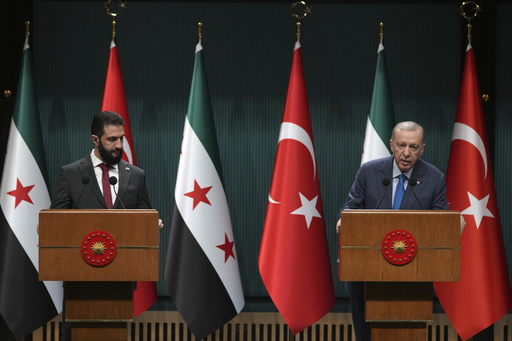
ANKARA — The interim president of Syria, Ahmad al-Sharaa, called for increased international pressure on Israel to withdraw from the buffer zone located in southern Syria during his visit to Ankara on Tuesday. He emphasized the need for collaboration between Turkey and Syria to address security challenges affecting both nations.
Following discussions with Turkish President Recep Tayyip Erdogan, al-Sharaa highlighted concerns related to the unification of Syrian territories, especially in the northeastern region. He underscored the importance of international intervention to ensure Israel’s compliance with the 1974 agreement, which mandates a withdrawal from the specified areas.
Al-Sharaa, who assumed the role of interim president last week after leading forces that ousted President Bashar Assad in December, visited Turkey to engage in talks primarily centered on Syria’s economic recovery. Additionally, the discussions touched on the presence of Kurdish-led forces in northern Syria, which Turkey views as a significant security threat. This visit was al-Sharaa’s second international trip following his earlier excursion to Saudi Arabia. Given that Turkey has been an important ally for anti-Assad factions throughout the 13-year civil war, al-Sharaa’s discussions with Erdogan were crucial.
Erdogan welcomed al-Sharaa with a modest ceremony, notably less elaborate than the military receptions given to other leaders. Al-Sharaa’s attire, a suit paired with a red tie, was interpreted as a respectful acknowledgment of the colors of the Turkish flag.
In a press briefing, Erdogan shared that their conversations focused on actionable strategies to foster security and economic stability within Syria. He expressed satisfaction with the alignment between the two leaders on almost all discussed topics, reiterating Turkey’s commitment to supporting Syria in combatting all forms of terrorism, including threats posed by Daesh and the PKK. “Working in unison is vital for the security of our countries and the broader region,” Erdogan stated.
Economic collaboration was a central theme of al-Sharaa’s remarks, as he proposed enhancing trade and investment partnerships between Turkey and Syria to promote economic growth and pave the way for a more prosperous future.
Turkey, which shares a 910-kilometer (565-mile) border with Syria, perceives the Kurdish militias, integral to the U.S.-backed Syrian Democratic Forces (SDF), as an affiliate of the outlawed Kurdistan Workers’ Party. Consequently, Turkey is advocating for the disbandment of the SDF. Currently, Turkish-backed fighters are engaging in conflicts with the SDF to push these Kurdish groups away from the Turkish frontier.
Mazloum Abdi, the commander of the SDF, reported in an interview that he recently met with al-Sharaa in Damascus. He indicated that discussions are ongoing, facilitated by mediators, focused on finding compromises regarding the future of Syria and the Kurdish issue.
Since the onset of the Syrian civil war in 2011, Turkey has hosted the largest number of Syrian refugees, peaking at over 3.8 million in 2022.

